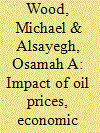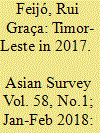|
|
|
Sort Order |
|
|
|
Items / Page
|
|
|
|
|
|
|
| Srl | Item |
| 1 |
ID:
175259


|
|
|
|
|
| Summary/Abstract |
This study mainly aims to assess the impact of an oil revenue shock on Iran's macroeconomic variables using a New Keynesian DSGE model as well as considering some main resource-rich developing countries characteristics such as capital scarcity, government's dominance in the economy, and public investment inefficiencies features. Here, the macroeconomic outcomes of implementing an alternative fiscal rule, namely, modified Bird-in-Hand (MBIH), in which both the development of infrastructures and future generations needs are taken into account are investigated and compared with the fiscal rule of the base scenario. The results are considered in four directions: First, an oil revenue increase shock causes the macroeconomic variables to rise in both scenarios, but the variables private-sector production, consumption, total investment, and non-oil GDP have a more increase under the MBIH scenario. Second, oil revenue accumulation in the oil fund under the MBIH scenario is significantly more than that in the base scenario. Third, government budget deficit experiences a higher increase, and public sector production experiences a less rise under the MBIH scenario. Fourth, the sensitivity analysis of public investment inefficiency shows that this factor acts as a serious barrier to the realization of the government's investment goals. Therefore, performing the first-best (MBIH) fiscal rule entails the reduction of the government's budget dependency on oil revenues through expanding the tax base, improving the public investment efficiency, and shrinking the public sector.
|
|
|
|
|
|
|
|
|
|
|
|
|
|
|
|
| 2 |
ID:
127884


|
|
|
|
|
| Publication |
2014.
|
| Summary/Abstract |
This paper describes the influences of oil revenue and government's policies toward economic developments and energy efficiency on the electricity and water demands. A Kuwait-specific electricity and water demand model was developed based on historic data of oil income, gross domestic product (GDP), population and electric load and water demand over the past twelve years (1998-2010). Moreover, the model took into account the future mega projects, annual new connected loads and expected application of energy conservation programs. It was run under six circumstances representing the combinations of three oil income scenarios and two government action policies toward economic diversification and energy conservation. The first government policy is the status quo with respect to economic diversification and applying energy conservation programs. The second policy scenario is the proactive strategy of raising the production of the non-oil sector revenue and enforcing legislations toward energy demand side management and conservation. In the upcoming 20 years, the average rates of change of the electric load and water demand increase are 0.13 GW and 3.0 MIGD, respectively, per US dollar oil price increase. Moreover, through proactive policy, the rates of average load and water demand decrease are 0.13 GW and 2.9 MIGD per year, respectively.
|
|
|
|
|
|
|
|
|
|
|
|
|
|
|
|
| 3 |
ID:
160414


|
|
|
|
|
| Summary/Abstract |
The year 2017 dawned in Timor-Leste with positive promises. Diplomatic efforts to secure a new maritime boundary and improve access to natural resources ended in a favorable deal. Elections let people have a voice on disputes of the previous year. But the returns took many by surprise, and instability returned to the arena.
|
|
|
|
|
|
|
|
|
|
|
|
|
|
|
|
|
|
|
|
|